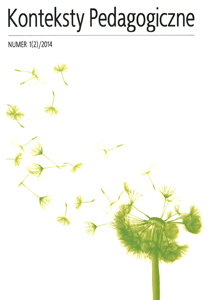Abstrakt
Współczesna edukacja dziecka zorientowana jest na kształtowanie różnorodnych kompetencji, szczególnie w zakresie umiejętności interpersonalnych. Podstawowym narzędziem komunikacji jest język, dlatego do jednych z najważniejszych zadań dydaktycznowychowawczych w przedszkolu i szkole należy kształtowanie umiejętności posługiwania się językiem polskim. W artykule przedstawiono twórczą koncepcję rozwoju mowy ucznia, jaką jest wykorzystanie japońskiego teatru kamishibai. Sztuka ta pobudza wrażliwość dziecka, zachęca do podejmowania dyskusji, wyrażania opinii i sądów. Dzięki temu dziecko wzbogaca swoje słownictwo i rozwija umiejętność formułowania dłuższych wypowiedzi.
Bibliografia
Czelakowska D., Metodyka edukacji wczesnoszkolnej, Kraków 2009.
KlimKlimaszewska A., Pedagogika przedszkolna. Nowa podstawa programowa,Wa rszawa 2010.
Mikuta M., Kultura żywego słowa,Częstochowa 2001.
Niedziela S., Czy potrzebne? Rozważania o kamishibai, http://www.tibum.pl/zalaczniki/Refleksje%20o%20Kamishibai.pdf [dostęp: 08.12.2013].
Pankowska K., Edukacja przez dramę, Warszawa 1997.
Way B., Drama w wychowaniu dzieci i młodzieży, przeł. K. Pankowska, E. Nerwińska, Warszawa 1997.
Netografia
http://www.tibum.pl/czym_jest_kamishibai [dostęp: 08.12.2013].
http://www.tibum.pl/zalaczniki [dostęp: 08.12.2013].
http://dziecisawazne.pl/magicznyteatrzykkamishibai/ [dostęp: 08.12.2013].
Autor zgodnie z zaleceniem MNiSW, by przeciwdziałać praktykom „ghostwriting” i „guest authorship” składając tekst dołącza oświadczenie Autora/Autorów, w którym deklaruje wkład każdego z Autorów w powstawanie publikacji. Własnoręcznie podpisane oświadczenie należy przesłać na adres redakcji:
Joanna Skibska | w formie skanu przesłać poprzez system OJS (biblioteka wydawcy).
Autorzy nie ponoszą żadnych kosztów w związku z publikacją artykułu na łamach czasopisma Konteksty Pedagogiczne oraz nie otrzymują gratyfikacji finansowej za opublikowanie tekstu. Redakcja zastrzega sobie prawo do wprowadzania niewielkich zmian w artykułach, które nie mają wpływu na merytoryczną stronę publikacji.
Autor (Autorzy) artykułu oświadcza, że przesłane opracowanie nie narusza praw autorskich osób trzecich. Wyraża zgodę na poddanie artykułu procedurze recenzji oraz dokonanie zmian redakcyjnych. Przenosi nieodpłatnie na Wydawnictwo Libron autorskie prawa majątkowe do utworu na polach eksploatacji wymienionych w art. 50 Ustawy z dnia 4 lutego 1994 r. o prawie autorskim i prawach pokrewnych – pod warunkiem, że praca została zaakceptowana do publikacji i opublikowana.
Wydawnictwo Libron posiada autorskie prawa majątkowe do wszystkich treści czasopisma. Zamieszczenie tekstu artykuły w repozytorium, na stronie domowej autora lub na innej stronie jest dozwolone o ile nie wiąże się z pozyskiwaniem korzyści majątkowych, a tekst wyposażony będzie w informacje źródłowe (w tym również tytuł, rok, numer i adres internetowy czasopisma).
Tekst jest udostępniany w internecie na licencji CC-BY-SA

